Riley Bailey, Karolina Hird, Angelica Evans, Grace Mappes, Christina Harward, and Frederick W. Kagan
Click here to see ISW’s interactive map of the Russian invasion of Ukraine. This map is updated daily alongside the static maps present in this report.
Click here to see ISW’s 3D control of terrain topographic map of Ukraine. Use of a computer (not a mobile device) is strongly recommended for using this data-heavy tool.
Click here to access ISW’s archive of interactive time-lapse maps of the Russian invasion of Ukraine. These maps complement the static control-of-terrain map that ISW produces daily by showing a dynamic frontline. ISW will update this time-lapse map archive monthly.
Note: The data cut-off for this product was 2:20pm ET on February 16 (excluding information pertaining to Avdiivka). ISW will cover subsequent reports in the February 17 Russian Offensive Campaign Assessment.
Ukrainian forces have begun to withdraw from Avdiivka, and Russian forces appear to be focused on complicating or preventing a complete Ukrainian withdrawal. Ukrainian Commander-in-Chief Colonel General Oleksandr Syrskyi stated early in the morning Ukrainian time on February 17 that he ordered Ukrainian forces within Avdiivka to withdraw to more favorable defensive positions in order to avoid encirclement and save the lives of Ukrainian personnel.[1] Syrskyi’s announcement comes after several confirmed Russian advances on the outskirts of Avdiivka in the past 24 hours. Geolocated footage published on February 16 indicates that Russian forces advanced further south along Hrushevskoho Street on Avdiivka’s western outskirts and south of the Avdiivka Coke Plant in northwestern Avdiivka, made marginal gains in dacha areas in northeastern Avdiivka, and captured the Avdiivka City Park in central Avdiivka.[2] The Ukrainian Tavriisk Group of Forces acknowledged earlier on February 16 that Ukrainian forces withdrew from an established fortified position south of Avdiivka and that Ukrainian forces are withdrawing from unspecified positions to new prepared defensive positions.[3] Ukrainian officials reported that Ukrainian forces are transferring reinforcements to the area to stabilize the situation and further degrade attacking Russian forces.[4] It is normal practice to bring in reinforcements to function as a receiving force that can allow withdrawing units to reconstitute behind prepared defensive positions. Russian sources claimed that Ukrainian forces are withdrawing en masse and that Ukrainian withdrawals are becoming increasingly chaotic and costly.[5] ISW has not observed any visual evidence of large or chaotic Ukrainian withdrawals, however, and the continued marginal rate of Russian advance in and around Avdiivka suggests that Ukrainian forces are currently conducting a relatively controlled withdrawal from Avdiivka.
Russian sources claimed that Russian forces also advanced in eastern Avdiivka, up to the southwestern outskirts of Avdiivka, further south along Hrushevskoho Street, and west of Avdiivka in the direction of dirt roads that Ukrainian forces are using to supply positions in eastern and southern Avdiivka.[6] Russian milbloggers claimed that Russian forces are close to cutting or have already cut one dirt road connecting Avdiivka with Lastochkyne (west of Avdiivka).[7] Russian sources claimed that Russian forces are close to encircling the remaining Ukrainian forces within central, eastern, and southern Avdiivka, with one Russian milblogger claiming that little more than a kilometer separates the Russian positions on the western outskirts of Avdiivka and the Russian positions in southern Avdiivka.[8] ISW currently assesses that roughly three and a half kilometers separate Russian advances in these two areas based on available visual evidence. Russian milbloggers claimed that up to 5,000 Ukrainian personnel remain in Avdiivka and are effectively trapped in the settlement, but Ukrainian Tavriisk Group of Forces Commander Brigadier General Oleksandr Tarnavskyi stated that Russian forces have not encircled any Ukrainian units in Avdiivka as of 1300 on February 16.[9] Ukrainian military observer Kostyantyn Mashovets stated that Russian forces are determined to prevent Ukrainian forces from withdrawing from Avdiivka in an organized manner.[10]
Ukrainian forces may have to conduct counterattacks to conduct an orderly withdrawal from Avdivika, and Russian efforts to complicate or prevent a Ukrainian withdrawal may become increasingly attritional. Ukrainian forces may have to stabilize the frontline by counterattacking in the area where Russian forces are trying to close the encirclement of Ukrainian forces in Avdiivka in order to conduct an orderly withdrawal. A Ukrainian brigade that recently redeployed to conduct counterattacks within Avdiivka stated on February 16 that it has recently helped Ukrainian forces render elements of the Russian 74th Motorized Rifle Brigade (41st Combined Arms Army [CAA], Central Military District [CMD]) and the 114th Motorized Rifle Brigade (Donetsk People’s Republic [DNR], 1st Army Corps [AC]) combat ineffective.[11] Further Russian gains within Avdiivka aimed at complicating the Ukrainian withdrawal and Ukrainian counterattacks covering withdrawing Ukrainian forces will likely result in further Russian losses. Russian forces would likely struggle to advance west of Avdiivka towards secondary prepared positions to which Ukrainian forces are withdrawing and would likely suffer considerable losses if they decided to frontally attack these Ukrainian positions across open fields. Russian forces likely aim to complicate or prevent the Ukrainian withdrawal in hopes of inflicting operationally significant losses on Ukrainian forces in the area, since the capture of Avdiivka itself would not offer any operationally significant benefits or avenues for operationally significant advances.[12]
Germany and France both signed bilateral security agreements with Ukraine on February 16. Ukrainian President Volodymyr Zelensky signed a long-term bilateral security agreement with German Chancellor Olaf Scholz on February 16 providing for bilateral cooperation in the military, political, financial, and humanitarian spheres until 2034.[13] The agreement also states that Germany will provide over €7 billion ($7.5 billion) in military aid to Ukraine in 2024, including a €1.1 billion ($1 billion) aid package that is currently being prepared and will include 36 howitzers, 120 thousand artillery shells (including 50,000 155mm artillery rounds), two Skynex air defense systems, missiles for the IRIS-T air-to-air missile system, 66 armored personnel carriers (APCs), several mine-clearing vehicles, and various reconnaissance drone models.[14] Zelensky also met with German Federal President Frank-Walter Steinmeier to discuss the launch of joint weapons production.[15] Zelensky later met with French President Emmanuel Macron to sign a bilateral security agreement and reported that France will provide Ukraine €3 billion ($3.2 billion) in military assistance over the course of 2024.[16]
NATO officials are increasingly warning that Russia poses a significant threat to NATO’s security. The Financial Times (FT) reported on February 16 that recent new assessments of Russia’s military capabilities and potential threats to NATO states have led Western leaders to recognize Russia’s continued military potential and to increase defense investment.[17] FT quoted unnamed British military intelligence officials who warned that Russia’s aggressive intent has persisted and that Russian air and naval assets are still ”largely intact” while Russian land forces have been degraded in Ukraine. The Russian Black Sea Fleet has been badly degraded by Ukrainian strikes, but most of the Russian Navy is stationed outside the Black Sea. FT noted that most Western officials expect that Russia would be able to reconstitute its forces ”within five to six years” (it is unclear if the officials are referring to 2030 or to a period starting with the end of the war, whenever that is) despite suffering major losses in Ukraine. This observation is consistent with ISW’s previous assessment that an end to the war on Russia’s terms would allow Russian forces to reconstitute rapidly and restore capabilities that Russia could use to attack NATO states.[18] Several European defense officials quoted by FT emphasized that there is a ”credible threat” that Russia could attack a NATO country in as few as three to five years. NATO officials’ increased warnings about the current state of the Russian threat align with ISW’s assessment that a Russia that emerges victorious in Ukraine poses a considerable threat to NATO and European security and that the West’s continued support for Ukraine to prevent Russian victory is therefore imperative for NATO‘s, and America’s, vital security interests.[19]
Independent Russian survey data suggests that most Russians are largely apathetic towards Russia’s war in Ukraine, particularly Russians who have not personally lost family members in Ukraine and are thus able to avoid thinking about the war entirely. Russian opposition outlet Verstka reported on February 16 that independent Russian sociological data suggests the overwhelming majority of Russians have come to view the war as a background event that does not affect their daily lives.[20] Verstka stated that most Russians avoid thinking about or discussing the war unless they personally experience the loss of a family member.[21] Verstka reported that Russians who have lost loved ones and are suffering as a result of the war are the ”silent majority” and do not make efforts to influence the general mood of Russian society.[22] Verstka noted that there is growing discontent among the family members of mobilized and contact servicemen still serving in Ukraine, but that Russians largely view the concept of ”victory” in Ukraine as a benefit for the Russian government and do not expect any personal benefits from Russia’s war in Ukraine.[23] The New York Times reported on February 15 that the Pentagon estimates that Russia has suffered roughly 60,000 personnel killed and another 300,000 personnel wounded during fighting in Ukraine since February 2022.[24] Russian President Vladimir Putin recently met with family members of deceased Russian servicemen and may be using such meetings to cater to the sizable constituency of people affected by personnel losses in Ukraine ahead of the March 2024 presidential election.[25] Verstka’s findings, along with reports about how Russian officials deal with the deaths of servicemembers, suggest that Russian society has largely accepted and internalized the war and that individual instances of resistance to the war are siloed and not transmitted amongst wider communities.
The Russian reaction to the reported death of imprisoned opposition politician Alexei Navalny on February 16 was relatively muted. The Federal Penitentiary Service of Yamalo-Nenets Autonomous Okrug, where Navalny had been imprisoned, stated on February 16 that Navalny died at the penal colony after going on a walk and feeling unwell.[26] Kremlin Spokesperson Dmitri Peskov stated that the Kremlin did not know anything about Navalny’s death and that Putin is aware of the death, though Putin has yet to comment about Navalny.[27] Other senior Russian officials expressed anger at accusations that the Kremlin was somehow involved in Navalny’s death and called for people to wait for the results of an investigation into the death and the results of the autopsy.[28] Russians across the country laid flowers and held minor demonstrations near memorials for political prisoners, but Russian law enforcement largely prevented demonstrations from growing too large, and the Moscow Prosecutor’s Office warned against participating in an alleged planned large demonstration.[29] A few Russian ultranationalist milbloggers reiterated Kremlin lines criticizing Western accusations of Russian involvement in Navalny’s death.[30] A prominent Russian milblogger claimed that Navalny’s death is unimportant compared to the current situation in Avdiivka, Donetsk Oblast, and another milblogger claimed that it was a significant mistake for Russia to imprison Navalny and “let him die there” ahead of the March 2024 presidential election.[31] The Russian Strelkov (Igor Girkin) Movement (RDS) expressed fear that Navalny’s death in Russian state custody and the detention of many other opposition figures in state custody could leave no one to lead a domestic resistance movement should Russia go to war directly against Western states.[32] Girkin’s wife Miroslava Reginskaya expressed concern for Girkin himself but claimed that his health is good.[33]
Key Takeaways:Ukrainian forces have begun to withdraw from Avdiivka, and Russian forces appear to be focused on complicating or preventing a complete Ukrainian withdrawal.
Ukrainian forces may have to conduct counterattacks to conduct an orderly withdrawal from Avdivika, and Russian efforts to complicate or prevent a Ukrainian withdrawal may become increasingly attritional.
Germany and France both signed bilateral security agreements with Ukraine on February 16.
NATO officials are increasingly warning that Russia poses a significant threat to NATO’s security.
Independent Russian survey data suggests that most Russians are largely apathetic towards Russia’s war in Ukraine, particularly Russians who have not personally lost family members in Ukraine and are thus able to avoid thinking about the war entirely.
The Russian reaction to the reported death of imprisoned opposition politician Alexei Navalny on February 16 was relatively muted.
Russian forces recently made confirmed advances along the Kupyansk-Svatove-Kreminna line, northwest of Bakhmut, and near Avdiivka.
Russian President Vladimir Putin continues to posture himself as an involved and effective wartime leader.
Russian-controlled courts in occupied Ukraine continue to pass harsh sentences on Ukrainian prisoners of war (POWs).
We do not report in detail on Russian war crimes because these activities are well-covered in Western media and do not directly affect the military operations we are assessing and forecasting. We will continue to evaluate and report on the effects of these criminal activities on the Ukrainian military and the Ukrainian population and specifically on combat in Ukrainian urban areas. We utterly condemn Russian violations of the laws of armed conflict and the Geneva Conventions and crimes against humanity even though we do not describe them in these reports.Russian Main Effort – Eastern Ukraine (comprised of two subordinate main efforts)
Russian Subordinate Main Effort #1 – Capture the remainder of Luhansk Oblast and push westward into eastern Kharkiv Oblast and encircle northern Donetsk Oblast
Russian Subordinate Main Effort #2 – Capture the entirety of Donetsk Oblast
Russian Supporting Effort – Southern Axis
Russian Air, Missile, and Drone Campaign
Russian Mobilization and Force Generation Efforts
Russian Technological Adaptations
Activities in Russian-occupied areas
Ukrainian Defense Industrial Base Efforts
Russian Information Operations and Narratives
Significant Activity in Belarus
Russian Main Effort – Eastern Ukraine
Russian Subordinate Main Effort #1 – Luhansk Oblast (Russian objective: Capture the remainder of Luhansk Oblast and push westward into eastern Kharkiv Oblast and northern Donetsk Oblast)
Russian forces recently made several confirmed marginal gains along the Kupyansk-Svatove-Kreminna line. Geolocated footage posted on January 27 shows that Russian forces advanced west of Synkivka on the eastern bank of Lake Lyman (northeast of Kupyansk) likely sometime in late January 2024.[34] Geolocated footage published on February 15 shows that Russian forces also recently advanced west of Karmazynivka (southwest of Svatove), and geolocated footage posted on February 16 shows that Russian forces recently advanced east of Yampolivka (west of Kreminna).[35] Ukrainian and Russian sources reported continued positional engagements northeast of Kupyansk near Synkivka; southeast of Kupyansk near Ivanivka, Tabaivka, and Tymkivka; west of Kreminna near Terny, Torske, and Yampolivka; and south of Kreminna near Bilohorivka.[36] A Russian milblogger claimed that Russian forces are fighting in the industrial zone east of Bilohorivka and that Ukrainian troops withdrew from the area before launching tactical counterattacks.[37] Elements of the ”Aida” group of Chechen ”Akhmat” Spetsnaz forces are reportedly operating near Bilohorivka.[38]
Russian Subordinate Main Effort #2 – Donetsk Oblast (Russian objective: Capture the entirety of Donetsk Oblast, the claimed territory of Russia’s proxies in Donbas)
Russian forces recently advanced northeast of Bakhmut. Geolocated footage published on February 15 indicates that Russian forces recently advanced northwest of Vesele (northeast of Bakhmut).[39] Positional fighting continued near Vesele on February 16.[40] Elements of the 6th Motorized Rifle Brigade (2nd Luhansk People’s Republic’s [LNR] Army Corps [AC]) are reportedly operating northeast of Bakhmut near Spirne.[41]
Russian forces reportedly advanced near Bakhmut amid continued positional fighting in the area on February 16. A Russian milblogger claimed that Russian forces advanced closer to the northern outskirts of Ivanivske (west of Bakhmut), although ISW has not observed any visual confirmation of this claim.[42] Positional fighting continued northwest of Bakhmut near Bohdanivka, west of Bakhmut near Ivanivske, southwest of Bakhmut near Klishchiivka and Andriivka, and south of Bakhmut near Pivdenne.[43] Elements of the Russian 106th Airborne (VDV) Division and 58th Spetsnaz Battalion (1st Donetsk People’s Republic [DNR] AC) are reportedly operating in the Bakhmut direction and elements of the 98th VDV Division’s 331st VDV Regiment are reportedly attacking in the direction of Chasiv Yar (west of Bakhmut).[44]
See the topline text for ISW’s daily update on the situation in Avdiivka.
Russian forces reportedly advanced southwest of Avdiivka on February 16. Russian milbloggers claimed that Russian forces advanced within Pervomaiske (southwest of Avdiivka), although ISW has not observed visual confirmation of this claim.[45] Positional fighting continued southwest of Avdiivka near Pervomaiske and Nevelske.[46]
Positional fighting continued west of Donetsk City near Krasnohorivka and Heorhiivka and southwest of Donetsk City near Pobieda and Novomykhailivka on February 16.[47] Elements of the Russian 5th Motorized Rifle Brigade (1st DNR AC) and the 150th Motorized Rifle Division (8th Combined Arms Army [CAA], Southern Military District [SMD]) are reportedly operating near Heorhiivka, and elements of the 155th Naval Infantry Brigade (Pacific Fleet) are reportedly operating near Novomykhailivka.[48]
Russian Supporting Effort – Southern Axis (Russian objective: Maintain frontline positions and secure rear areas against Ukrainian strikes)
The Ukrainian General Staff reported that Russian forces unsuccessfully attacked southeast of Velyka Novosilka near Prechystivka and south of Velyka Novosilka near Staromayorske.[49] Elements of the Russian 14th Spetsnaz Brigade (Russian General Staff’s Main Directorate [GRU]) are reportedly operating near Staromayorske.[50] Ukrainian military observer Kostyantyn Mashovets stated that the recently reorganized Russian Eastern Grouping of Forces in the Novopavlivka direction (western Donetsk Oblast and Donetsk-Zaporizhia Oblast border area) includes nine brigades, 11 regiments, two battalions, and three battalion-sized tactical detachments, including BARS (Russian Combat Reserves) and ”Storm”-type detachments.[51] Mashovets stated that Russian forces have one infantry regiment and up to three battalions in reserve in this direction.
A Russian milblogger claimed that positional engagements continued near Robotyne, Novoprokopivka (south of Robotyne), and Verbove (east of Robotyne).[52] Mashovets stated that elements of the Russian 35th Combined Arms Army (CAA) (Eastern Military District [EMD]), including two motorized rifle brigades, one cover brigade, one motorized rifle regiment, one tank battalion, and two BARS-type tactical detachments, are operating in the Orikhiv direction (likely referring to the Polohy-Hulyaipole area) as part of the Russian Eastern Grouping of Forces.[53] Mashovets stated that elements of the Russian 58th CAA (Southern Military District [SMD]), including two brigades, 19 regiments, 10 battalions, and 10 BARS tactical detachments, are operating in the Orikhiv direction (likely referring to the Robotyne area) as part of the recently reorganized Dnepr Grouping of Forces.[54] Mashovets stated that Russian forces have up to four motorized rifle regiments of the territorial troops and one battalion in reserve in this direction. Elements of the Russian 71st Anti-Aircraft Missile Brigade (35th CAA, EMD) are reportedly operating in the Zaporizhia direction.[55]
Ukrainian sources stated that positional engagements continued near Krynky.[56] Mashovets stated that the Russian Dnepr Grouping of Forces operating in the Dnipro (Kherson) direction includes nine brigades, 19 regiments, nine battalions, and three BARS and ”Storm” tactical detachments with one infantry regiment in reserve.[57] Mashovets stated that the Dnepr Grouping of Forces is likely responsible for the Crimea direction and may undertake offensive actions in the lower Dnipro River area (likely referring to east bank Kherson Oblast) in the future.[58] Mashovets stated that the Dnipro Grouping of Forces includes a ”powerful” group of Russian Airborne (VDV) and naval infantry forces, including elements of the 104th, 7th, and 76th VDV Divisions; the 49th Separate Air Assault Brigade (reportedly subordinated to the 58th Combined Arms Army, Southern Military District); the 83rd VDV Brigade; the 810th Naval Infantry Brigade (Black Sea Fleet); the 61st Naval Infantry Brigade (Northern Fleet); and the 177th Naval Infantry Regiment (Caspian Flotilla).[59]
Russian Air, Missile, and Drone Campaign (Russian Objective: Target Ukrainian military and civilian infrastructure in the rear and on the frontline)
Nothing significant to report.
Russian Mobilization and Force Generation Efforts (Russian objective: Expand combat power without conducting general mobilization)
Russian President Vladimir Putin continues to posture himself as an involved and effective wartime leader. Putin visited the “Robot Factory” at the Chelyabinsk Forging and Press Plant and the Stankomash Industrial Park in Chelyabinsk on February 16, which produce industrial robotics and industrial machinery parts, respectively.[60] Putin received reports on each facility’s production metrics and received questions from employees and engineering students about the development of the Southern Urals and Russian industry.[61]
Russian Technological Adaptations (Russian objective: Introduce technological innovations to optimize systems for use in Ukraine)
Nothing significant to report.
Ukrainian Defense Industrial Efforts (Ukrainian objective: Develop its defense industrial base to become more self-sufficient in cooperation with US, European, and international partners)
Ukraine officials continue to highlight the importance of Ukrainian technological innovation and Ukraine’s defense industrial base (DIB) in supporting the Ukrainian war effort. Ukrainian Deputy Prime Minister and Minister of Digital Transformation Mykhailo Fedorov stated on February 16 that Ukraine is innovating and developing a new doctrine of war through its use of drones.[62] Ukrainian Deputy Defense Minister Lieutenant General Ivan Havrylyuk stated that Ukraine’s efforts to develop an unmanned systems force will minimize human participation and casualties in the war.[63] Ukrainian National Security and Defense Council Secretary Oleksiy Danilov stated that Ukraine’s private and state DIB companies are playing a major role in Ukraine’s war effort and noted that whoever masters new technology will win the war.[64] Danilov stated that Ukraine’s missile program is advancing and working to overcome unspecified technological challenges.[65] Ukrainian Defense Minister Rustem Umerov stated on February 15 that Ukraine and NATO should focus on building long-term defense capabilities and a sustainable DIB and noted that Ukraine is prepared to work with its partners to create joint ventures and invest in scaling up Ukrainian domestic production.[66]
Activities in Russian-occupied areas (Russian objective: Consolidate administrative control of annexed areas; forcibly integrate Ukrainian citizens into Russian sociocultural, economic, military, and governance systems)
Russian-controlled courts in occupied Ukraine continue to pass harsh and likely illegal sentences on Ukrainian prisoners of war (POWs). The Donetsk People’s Republic (DNR) Supreme Court sentenced seven Ukrainian servicemembers to terms of 25 to 28 years in maximum security penal colonies for “murder and attempted murder in a generally dangerous manner motivated by ideological and political hatred” in connection with alleged Ukrainian artillery strikes on villages in occupied Donetsk Oblast.[67] Ukrainian Mariupol Mayoral Advisor Petro Andryushchenko noted that DNR courts have sentenced over 60 Ukrainian servicemembers to such terms in 2024 alone.[68] Former Ukrainian Deputy General Prosecutor Gyunduz Mamedov responded to another recent DNR court’s mass sentencing of 33 Ukrainian POWs on February 8 and noted that this sentencing violates international legal guarantees to the right to a fair trial.[69] Considering that international law does not recognize the legitimacy of the DNR in the first place, rulings made by DNR courts are therefore also likely illegitimate under international law and may constitute a violation of the Geneva Convention on the Treatment of Prisoners of War.[70] ISW has previously reported on Russian show trials for Ukrainian POWs and assessed that this is likely a method of increasing tools of social and legal repression in occupied areas, demoralizing Ukrainians, and discouraging residents of occupied Ukraine from affiliating with their Ukrainian identity.[71]
Russian occupation authorities continue to use educational programs as a propaganda tool in occupied areas. DNR Head Denis Pushilin attended a meeting of the supervisory board of the “Znanie” (Knowledge) Society on February 16 and highlighted the importance of educational opportunities for youth living in occupied Donetsk Oblast.[72] ”Znanie” is a Russian public non-profit that carries out educational work in Russia, and now occupied Ukraine, as part of a presidential mandate on ”mass educational organization.”[73] ”Znanie” existed in Soviet times as an intellectual propaganda arm, and Pushilin reported that Russian First Deputy Presidential Head Sergei Kiriyenko is working to ”revive” the Soviet-style ”Znanie” organization for the modern era.[74] ”Znanie” will reportedly begin offering lectures in occupied Donetsk Oblast, likely as part of Russification efforts.
Russian occupation authorities continue efforts to consolidate control over information access in occupied areas. Kherson Oblast occupation head Vladimir Saldo met with Russian Deputy Prime Minister for Tourism, Sport, Culture, and Communications Dmitry Chernyshenko on February 16 to discuss Russian integration projects for occupied Kherson Oblast.[75] Chernyshenko noted that Russian occupation authorities have installed 17,735 sets of ”Russkiy Mir” television satellites, covering over 80 percent of occupied Kherson Oblast, and are providing residents with the ability to watch Russian television channels to receive ”objective information.”[76] Russian occupation authorities are likely using Russian satellite television such as the ”Russkiy Mir” model to control information disseminated to residents of occupied territories.
Russian Information Operations and Narratives
Russian Foreign Minister Sergei Lavrov and Russian Permanent Representative to the Organization for Security and Cooperation in Europe (OSCE) Alexander Lukashevich reiterated Kremlin narratives on February 15 and 16 intended to blame the West for Russia’s invasion of Ukraine, present Russia as a victim of perceived Western aggression, and undermine Western support for Ukraine.[77] Lavrov specifically claimed that the West is attempting to ”bewitch” members of the alleged ”world majority” to support Ukrainian President Volodymyr Zelensky’s peace plan.[78] ISW has recently observed increased Russian claims about an anti-Western ”world majority,” which suggests that the Kremlin is likely insecure about the possibility of its diplomatic isolation against the backdrop of Russia’s full-scale invasion of Ukraine.[79]
Significant activity in Belarus (Russian efforts to increase its military presence in Belarus and further integrate Belarus into Russian-favorable frameworks and Wagner Group activity in Belarus)
Belarusian President Alexander Lukashenko claimed that Belarusian security forces detained several individuals, including three Belarusians, on the Belarusian-Ukrainian border as part of a counterterrorist operation on February 16.[80] Lukashenko claimed that the detainees planned to conduct sabotage operations on Belarusian territory and that Belarusian security forces routinely conduct multiple counterterrorist operations on the Belarusian-Ukrainian border per week.[81]
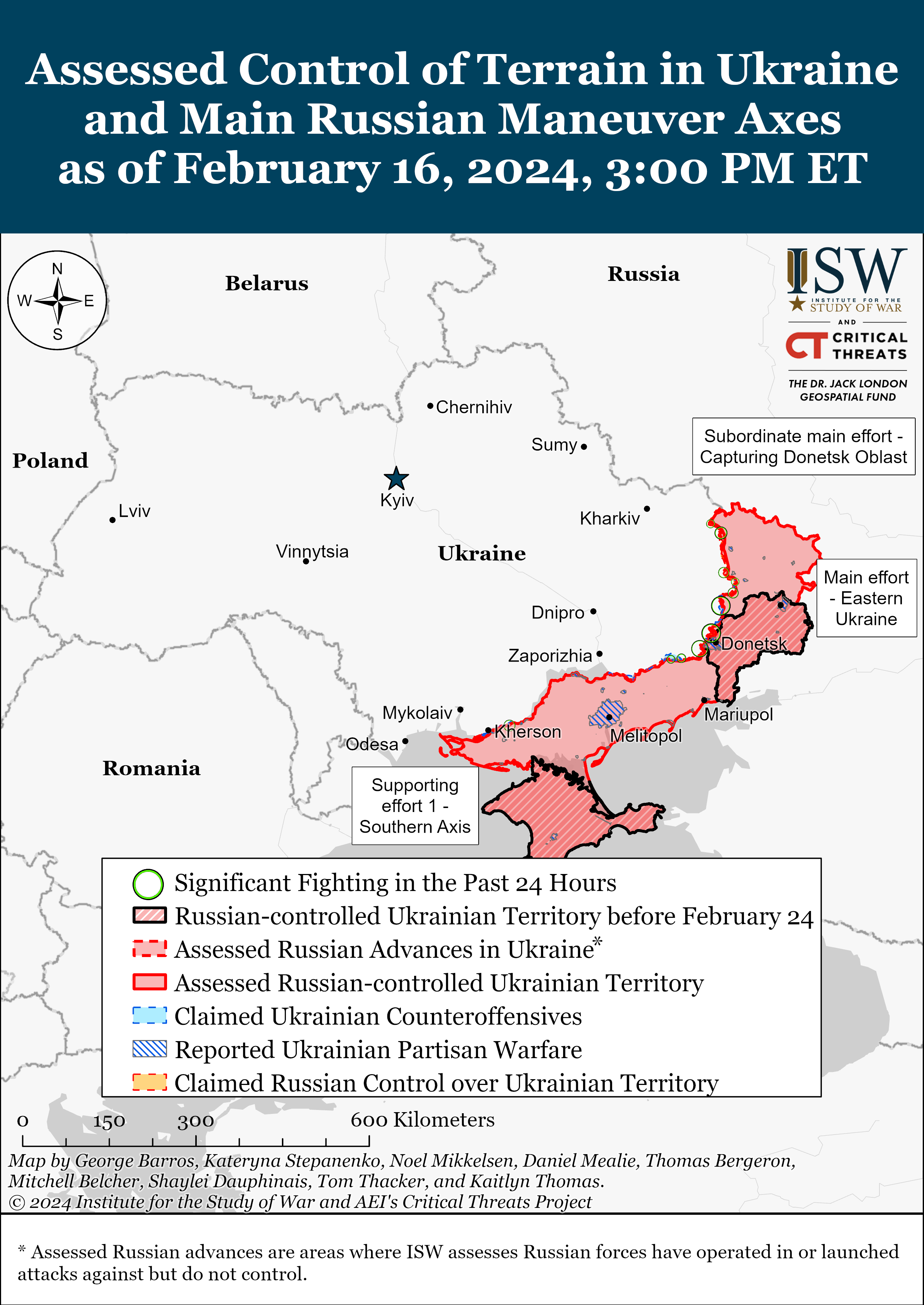
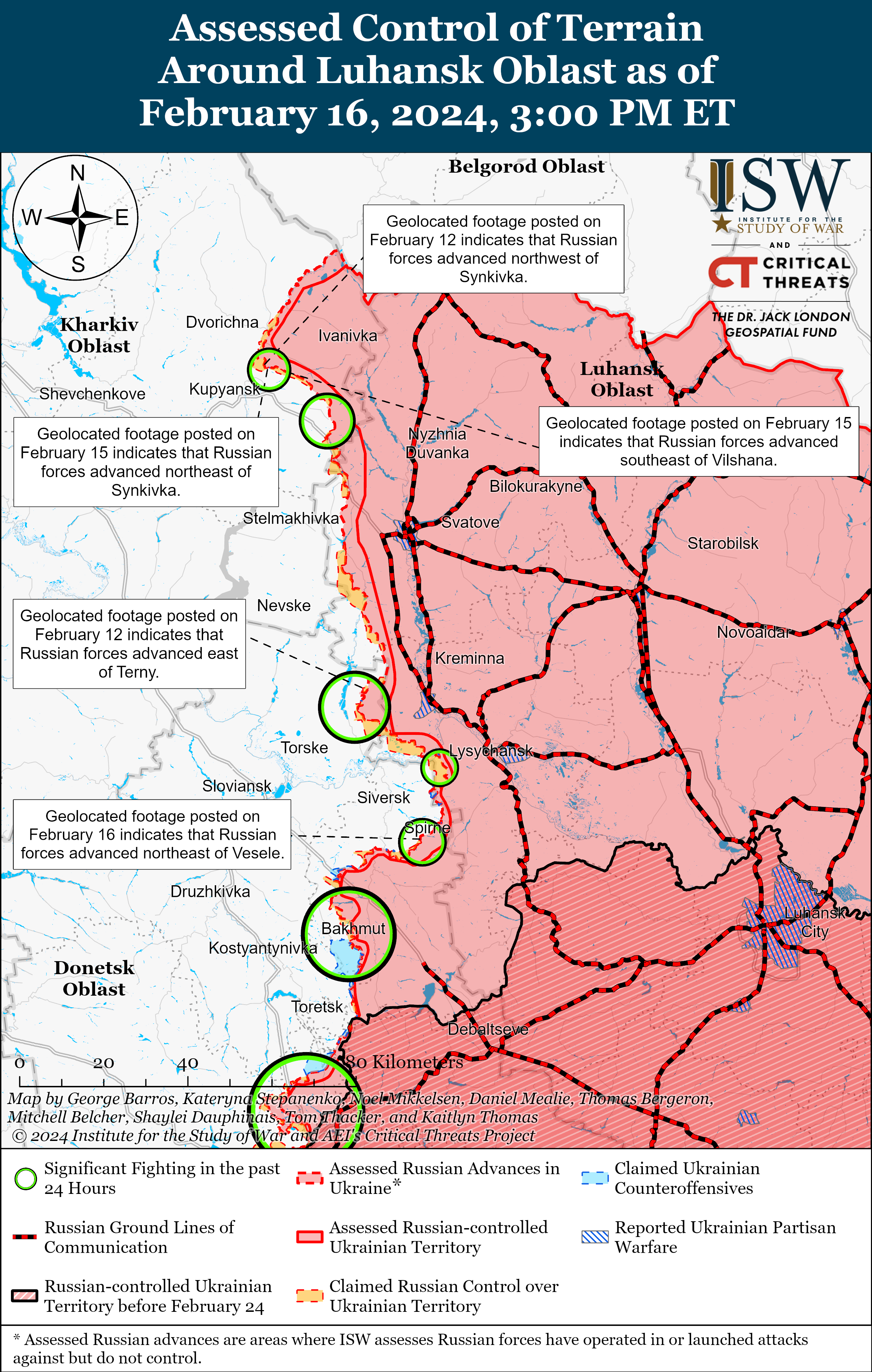
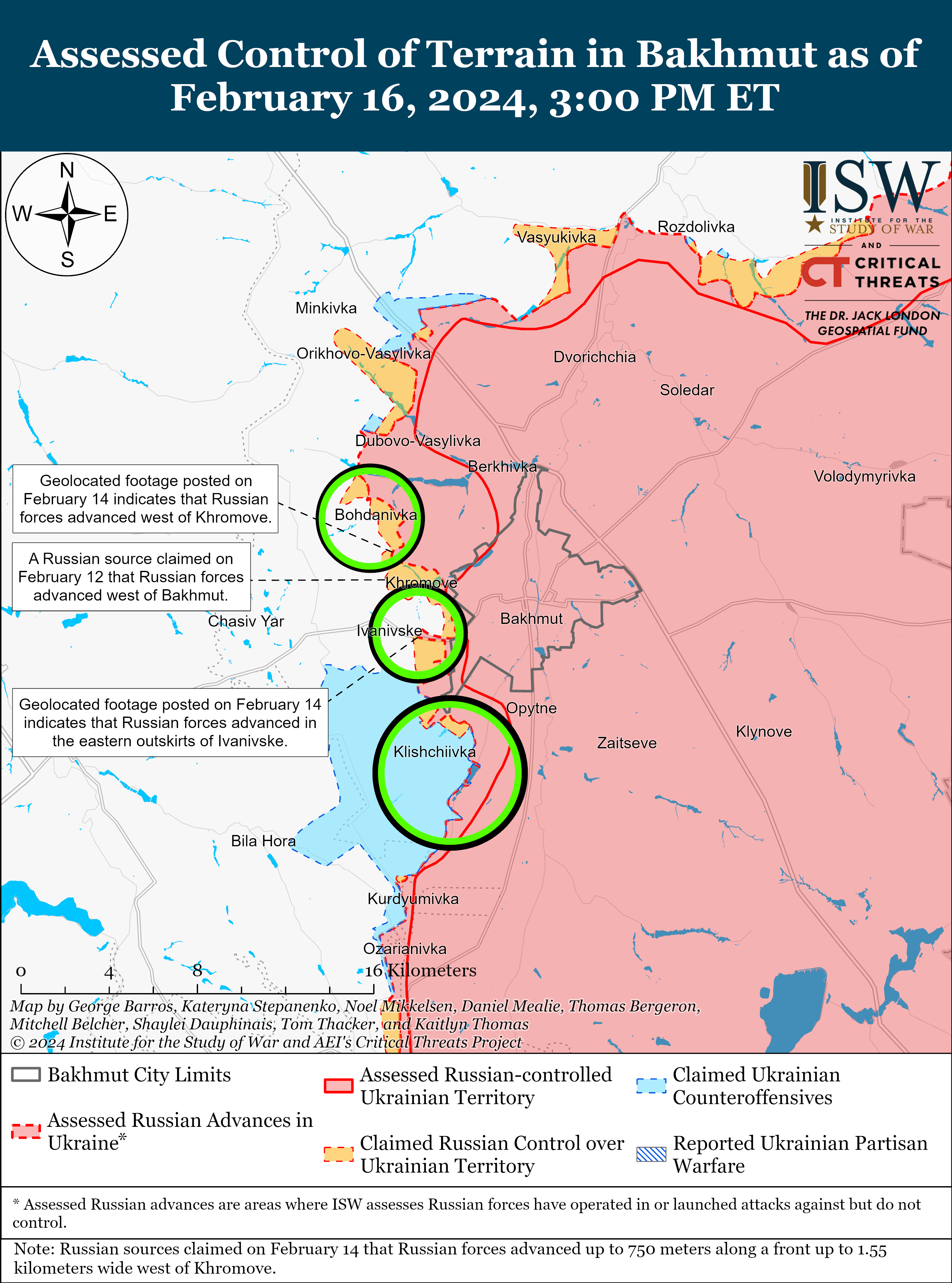
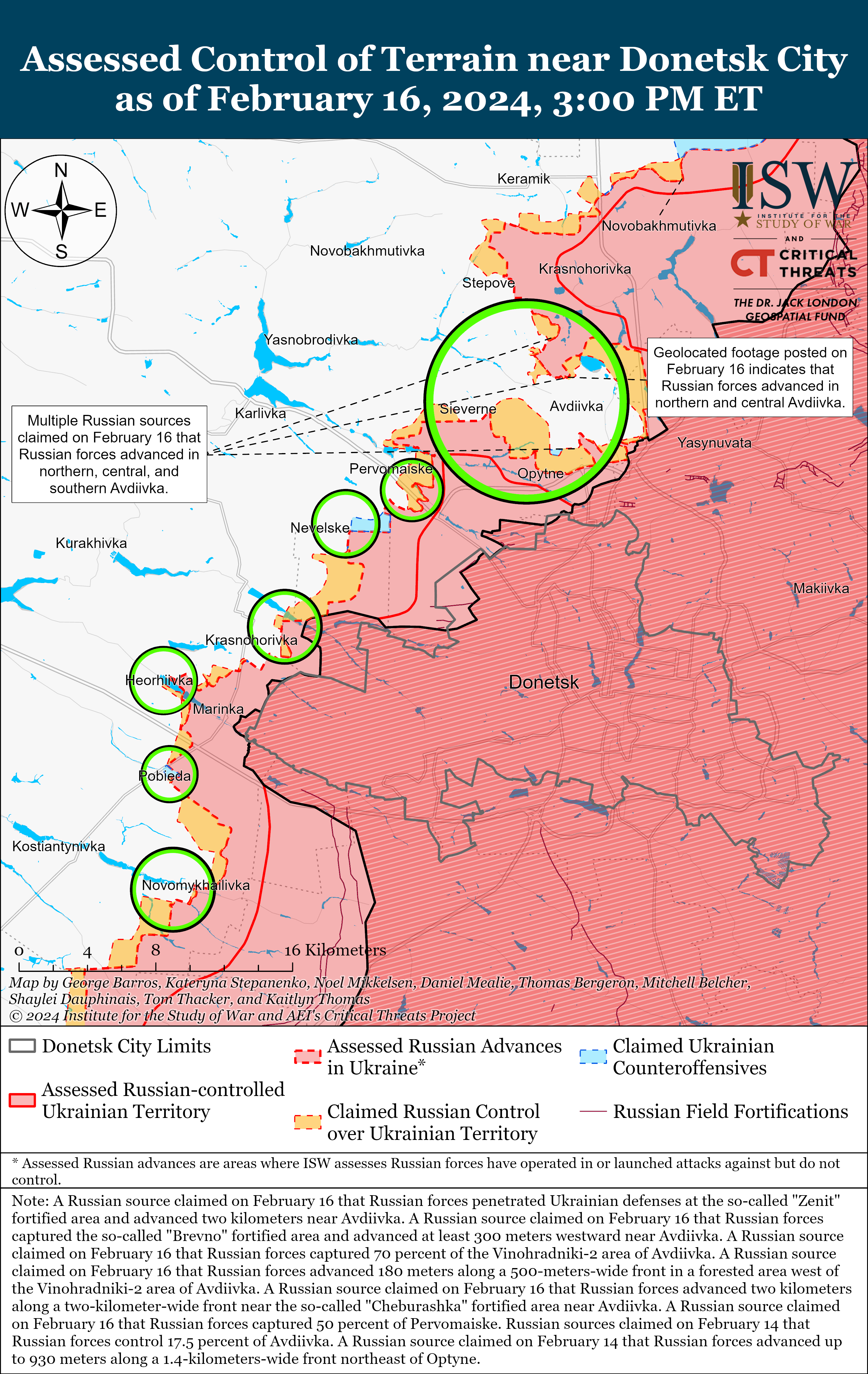
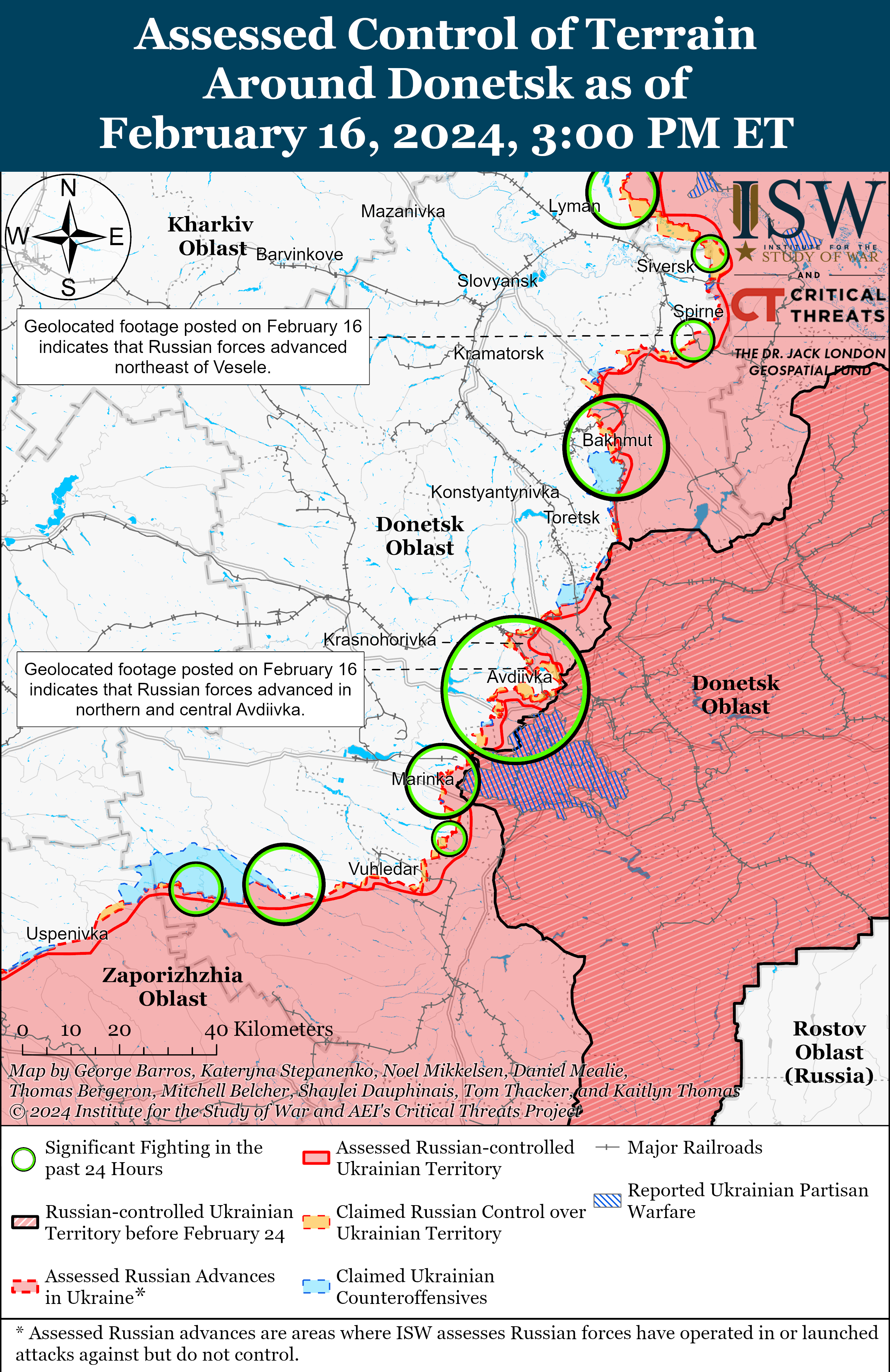
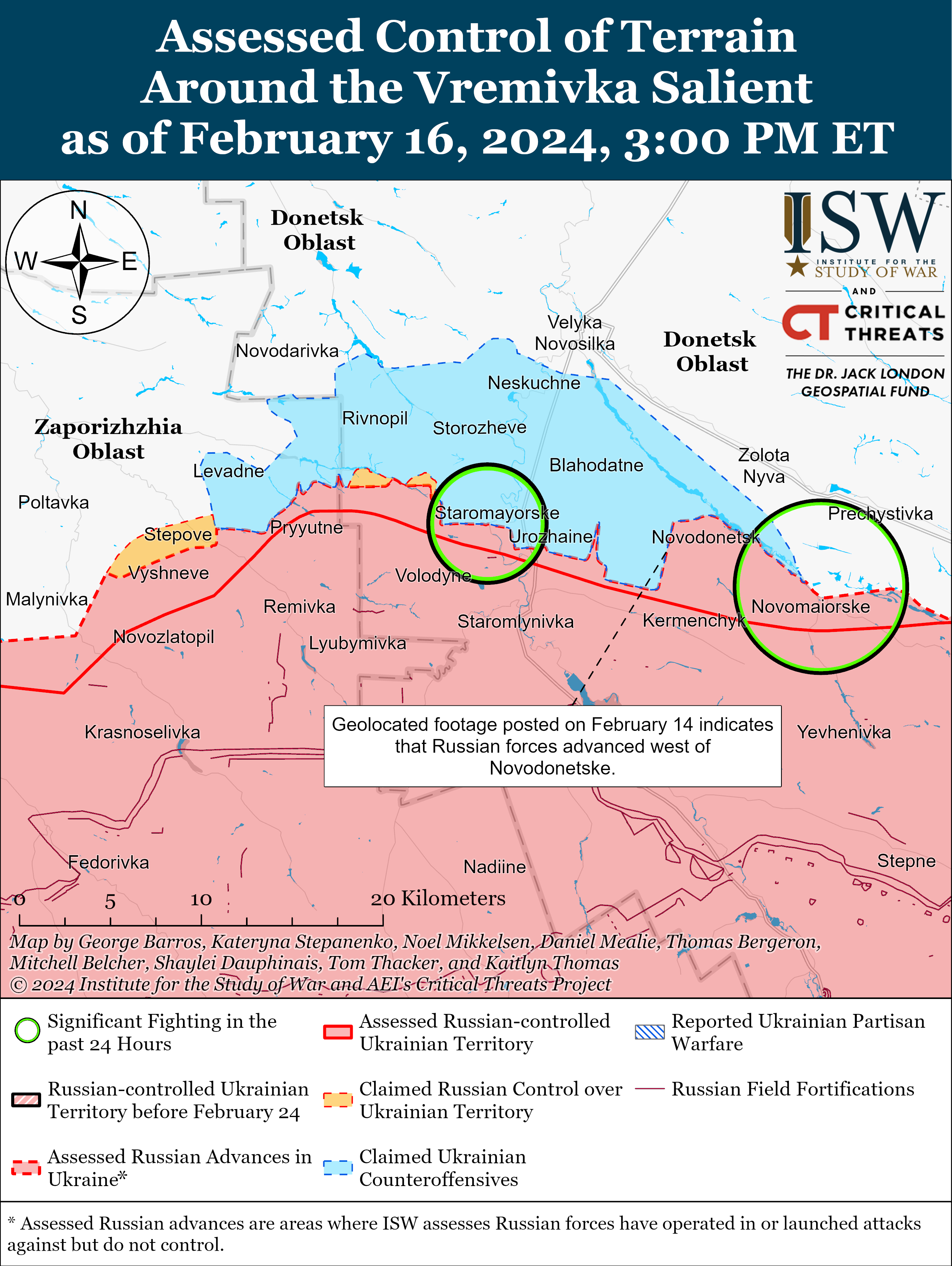
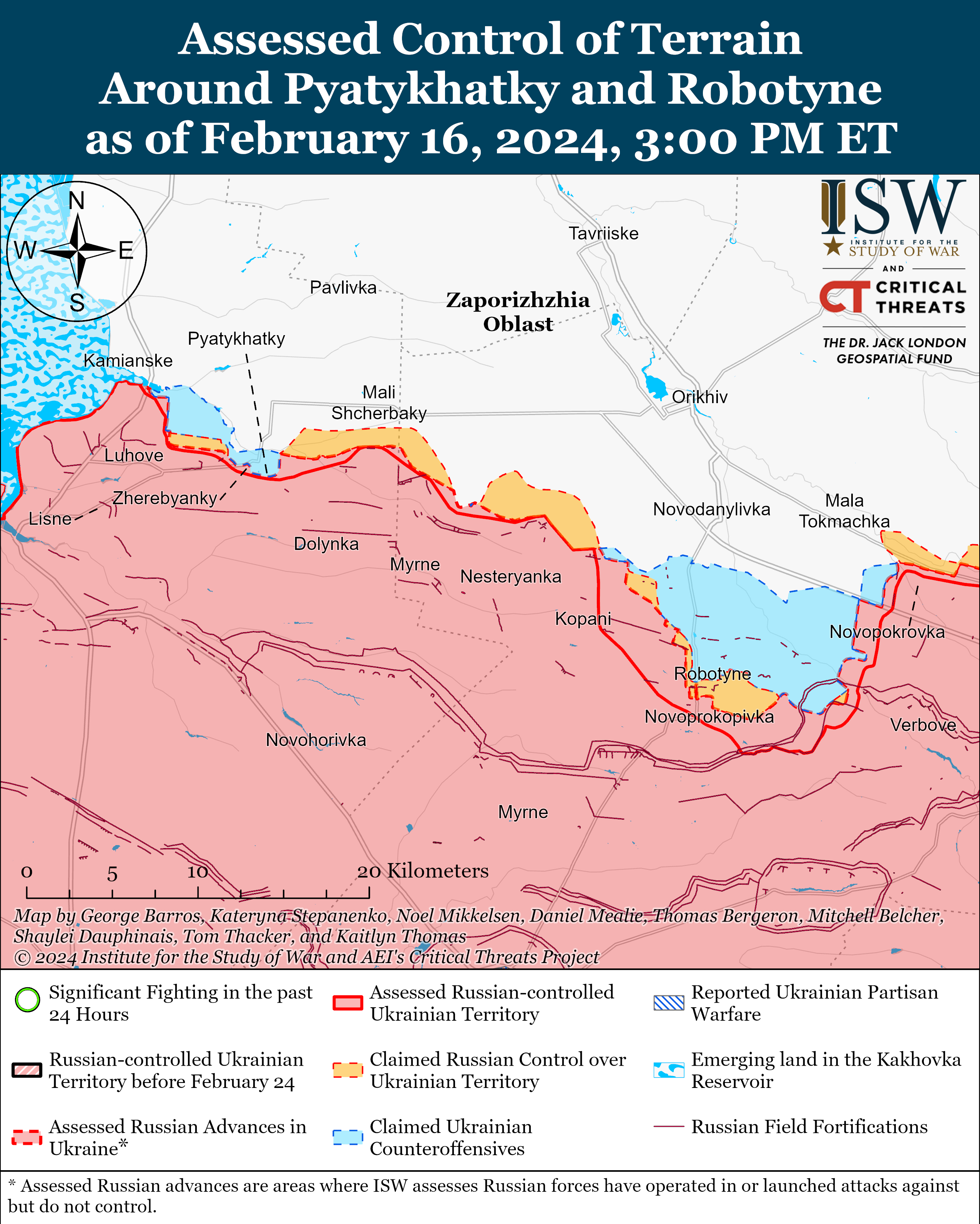
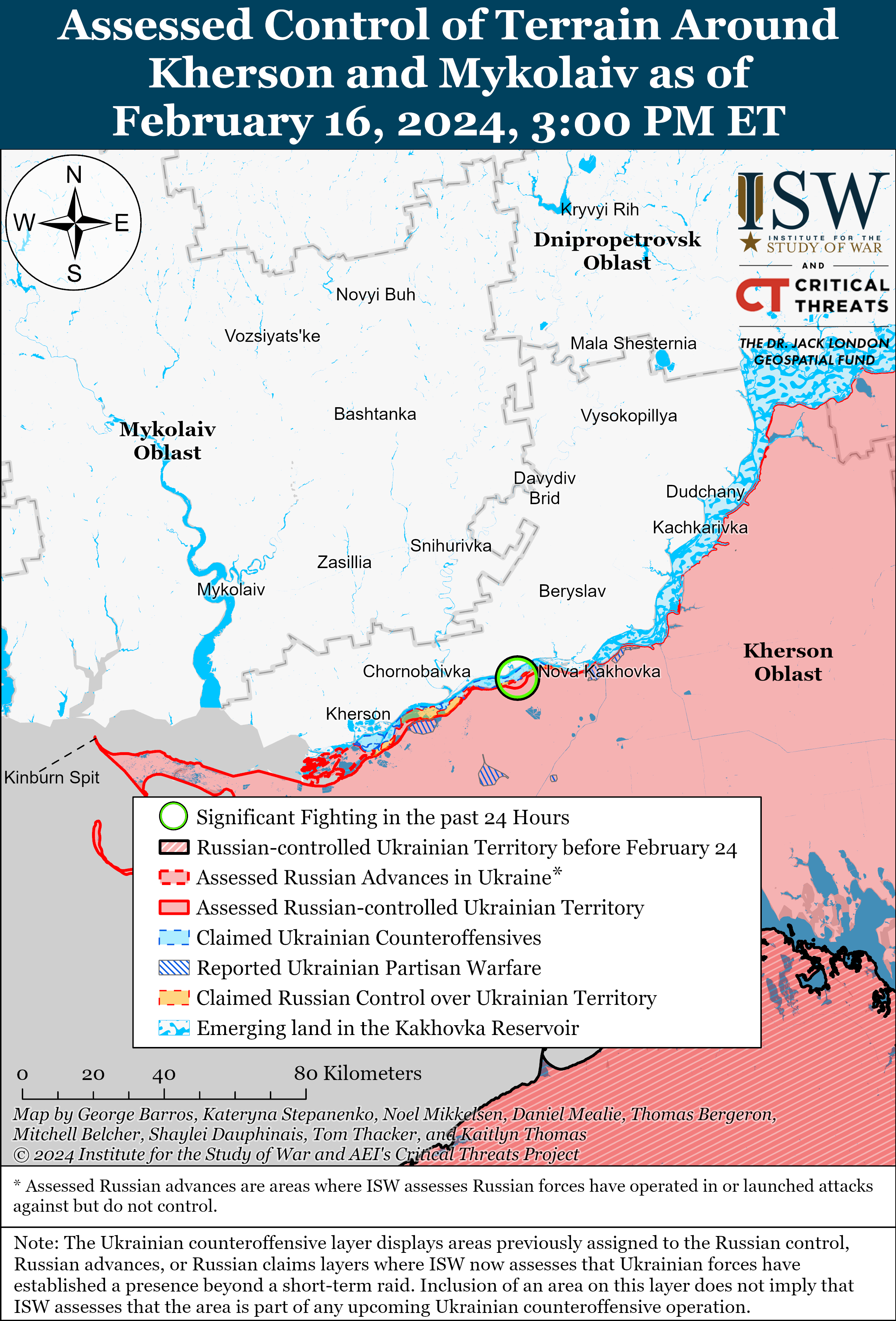
No comments:
Post a Comment